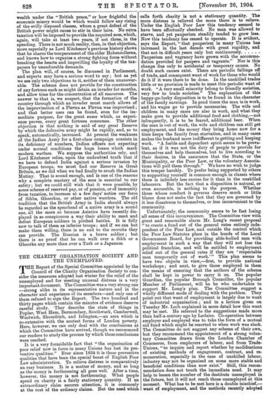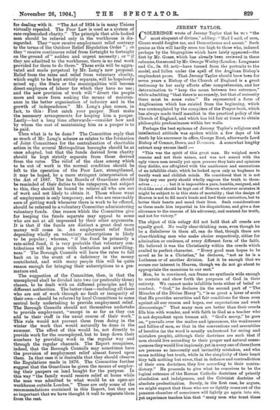It is a very formidable fact that " the organisation
of poor relief now in force in many Unions has lost its pre- ventive qualities." Ever since 1834 it is these preventive qualities that have been the special boast of English Poor Law administration. To relieve distress is comparatively an easy business. It is a matter of money, and so long as the money is forthcoming all goes well. After a time, however, the money is not forthcoming. What people spend on charity is a fairly stationary quantity. If an extraordinary claim secures attention, it is commonly at the cost of the ordinary claims. But the need which calls forth charity is not a stationary quantity. The more distress is relieved the more there is to relieve. Under the English Poor Law this tendency seemed to have been effectually checked. No man was allowed to starve, and yet pauperism steadily tended to grow less. Now this tendency has ceased to operate. It is evident, says the Report, " that pauperism in many Unions has increased in the last decade with great rapidity, and that not in difficult years only but continuously Pauperism and vagrancy have grown with the accommo- dation provided for paupers and vagrants." Nor is this change due only to accidental or temporary causes. No doubt such causes exist. There are periodic fallings off of trade, and consequent want of work for those who would do it if it were there to be done. In the unskilled trades little or no provision is made to meet this periodic want of work. "A very small minority belong to friendly societies, very few to trade societies.' The explanation of this happy-go-lucky disposition is to be found in the character of the family earnings. In good times the man is in work, and his wages go to provide necessaries. The wife and children in many cases are also in work, and what they make goes to provide additional food and clothing,—not infrequently, it is to be feared, additional beer. When the man is out of work, the wife and children can still get employment, and the money they bring home now for a time keeps the family from starvation, and in many cases makes the husband more indifferent to getting and keeping work. "A feeble and dependent spirit seems to be preva- lent, as if it was not the duty of people to provide for themselves and help themselves, but to live according to their desires, in the assurance that the State, or the Municipality, or the Poor Law, or the voluntary Associa- tions will pull them through." We have no wish to judge this temper harshly. To prefer being supported by others to supporting yourself is common enough in classes where there is infinitely less excuse for it than in the unskilled labourers. But the fact that a disposition is natural, or even excusable, is nothing to the purpose. Whether those whose conduct it governs deserve much or little blame does not make the fact that they are governed by it less disastrous to themselves, or less inconvenient to the community.
Unfortunately, the community seems to be fast losing all sense of this inconvenience. The Committee view with great and reasonable alarm Mr. Long's recent proposal " to create a fund out of the general rates entirely inde- pendent of the Poor Law, and outside the control which the Poor Law Statutes place in the hands of the Local Government Board, for providing able-bodied men with employment in such a way that they will not lose the political franchise, and will be entitled to employment relief out of the general rates if they are respectable men temporarily out of work.'" This plan seems to have two objects in view,—first, to provide national workshops ; and next, to give those employed in them the means of ensuring that the authors of the scheme shall be kept in power to carry it on. The popular Guardian, the popular Borough Councillor, the popular Member of Parliament, will be he who undertakes to support Mr. Long's plan. The Committee suggest a wholly different mode of dealing with the problem. They point out that want of employment is largely due to want of industrial organisation ; and in a lecture given on Tuesday Mr. Loch explained in more detail how this want may be met. He referred to the suggestions made more than half-a-century ago by Leclaire. Co-operation between employer and employed was to take the form of a mutual aid fund which might be-resorted to when work was slack. The Committee do not suggest any scheme of their own, but they recommend the appointment of a strong volun- tary Committee drawn from the London Chamber of Commerce, from employers of labour, and from Trade- Unions, " to inquire and report whether by modifications of existing methods of engagement, contract, and re- muneration, especially in the case of unskilled labour, industry may not be organised on some more stable and beneficial conditions than now exist." Still, this recom- mendation does not touch the immediate need. It may help to lessen the number of the destitute unemployed in the future, but it will not reach those unemployed at this moment. What has to be met here is a double mischief,— want of employment, and the methods recently adopted for dealing with it. "The Act of 1834 is in many Unions virtually repealed. The Poor Law is used as a system of rate-replemished charity." The principle that able-bodied men should be relieved only in the workhouse is dis- regarded. They " now receive employment relief contrary to the terms of the Outdoor Relief Regulation Order " ; or they " receive continuous relief from fortnight to fortnight on the ground of " sudden and urgent necessity; or " if they are admitted to the workhouse, there is no real work provided for them to do there." These evils will be aggra- vated. and made perpetual by Mr. Long's new proposal. Relief from the rates and relief from voluntary charity, which ought to be kept strictly separate, will be hopelessly mixed up ; the State or the municipalities will become direct employers of labour for which they have no use ; and the new provision of work will " divert the people more and more from seeking the means of maiuten- ance in the better organisation of industry and in the growth of independence." Mr. Long's plan comes, in fact, to this : First catch your pauper. Next make the necessary arrangements for keeping him a pauper. Lastly—but a long time afterwards—consider how and by whom the cost of maintaining him as a pauper is to be paid.
Then what is to be done ? The Committee reply that so much of Mr. Long's scheme as relates to the formation of Joint Committees for the centralisation of charitable action in the several Metropolitan boroughs should be at once adopted, but that the funds derived from charity should be kept strictly separate from those derived from the rates. The relief of the class among which to be out of work is the normal condition should. be left to the operation of the Poor Law, strengthened, it may be hoped, by a more stringent interpretation of the Act of 1887. The lax Boards of Guardians should be reminded of their duties to the ratepayers, but subject to this, they should be bound to relieve all who are out of work and not likely to obtain it. Those whose want of employment is only temporary, and who are reasonably sure of getting work whenever there is work to be offered, should be referred to a voluntary Committee administering voluntary funds. One reason which the Committee give for keeping the funds separate may appeal to some who are not at all impressed by their other arguments. It is that if the funds are distinct a great deal more money will come in. An employment relief fund. depending wholly on voluntary subscriptions is likely to be popular ; whereas, "if the fund be primarily a rate-aided fund, it is very probable that voluntary con- tributions will be given with hesitation and unwilling- ness." The Borough Councils will have the rates to fall back on in the event of a deficiency in the money contributed, and with many people this will be quite reason enough for bringing their subscriptions to a pre- mature end.
The suggestion of the Committee, then, is that the unemployed shall be divided into two (or preferably three) classes, to be dealt with on different principles and by different authorities. The better class—including all those who are out of work through no fault or incapacity of their own—should. be referred by local Committees to some central body undertaking to provide employment relief. The Borough Councils should not themselves undertake to provide employment, "except in so far as they can add to their staff in the usual course of their work." This rule would not prevent them from doing in the winter the work that would naturally be done in the summer. The effect of this would be, not directly to provide work for the unemployed, but to keep down their numbers by providing work in the regular way and through the regular channels. The Report recognises, indeed, that the Borough Councils may sometimes have the provision of employment relief almost forced upon them. In that case it is desirable that they should observe the Regulations made in 1876. The Committee further suggest that the Guardians be given the means of employ- ing their paupers on land bought for the purpose. In this way " the family would receive relief at home while the man was admitted to what would be an open-air workhouse outside London." These are only some of the recommendations contained in this Report, but they are so important that we have thought it well to separate them from the rest.















































 Previous page
Previous page